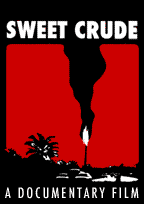Political Action
Quick Links
When we were in the Delta filming, we were asked to use what power we have as Americans, filmmakers and witnesses to bring the urgency of this story to light. Most of the stakeholders are willing to come to the negotiating table. But this has been tried before – it will take third-party intervention to make any agreements stick. A group of us is working on several fronts to help this happen. Sandy’s high-profile media interviews are raising visibility. We are reaching out to a large network of NGOs and U.S. legislators to bring attention to the issues, hopefully resulting in a call for talks.
We hope you'll consider getting involved. Find out how.
Peace is a work in progress
Why the Niger Delta
Oil extraction and corruption have left Nigeria's Niger Delta in an environmental, political, economic and humanitarian crisis. The region is seething with a recently emerged armed resistance – which has shut down significant oil production, while drawing a military response from the Nigerian government. There's a sustainable development opportunity here, which could be realized with the return of peace and stability. The stakes are high, locally and globally. This region is iconic of the current convergence of environmental justice and human rights. And it represents an opportunity to address the resource curse reality that is today's most pressing frontier of war and peace.
Why now
We're at a moment of hope and danger. After the election of President Y'ar Adua and Vice President Goodluck Jonathan in Spring 2007, there was cautious optimism. Momentum was building for serious negotiations to resolve the crisis. In response, there was a tenuous truce in most of the Delta. But the situation on the ground is fragile. Criminal elements at the fringes of the cause are injecting volatility and jeopardizing the will toward a political solution. The stakeholders (villagers, militants, government, oil companies) seem ready to come to the table. But given the long history of broken promises, key players are insisting on talks with accountability, ideally under the auspices of an internationally trusted entity. Third-party monitoring is imperative – for transparency and for a transition to political legitimacy for the militancy.
What we believe is needed
It's going to take something different to cut through the seeming intractability of the current situation. While there is ongoing concern, reporting and action by a range of individuals, media, politicians, NGOs and even the oil companies themselves – these efforts are largely isolated. It's time to use the power of a united voice. We are calling for a coalition of US and EU lawmakers, dignitaries, journalists and others of influence to request a model similar to the Good Friday Peace Agreement. Beginning with a fact-finding mission and progressing to negotiations, the desired outcome is a binding agreement for all stakeholders that creates a lasting blueprint for a peaceful resolution. We believe that the right path is preventive diplomacy rather than a covert military solution in yet another country devastated by the bounty of oil. The Niger Delta provides more oil to the US than Iraq and Kuwait combined. Whether the agenda is to address the humanitarian crisis or simply to secure the oil supply, it's time for a new approach.
What it could mean
It is too easy to spend time in Nigeria and reduce the discussion to what a mess it all is. We reject that. This is the perfect place to actually and symbolically overcome the "resource curse."
- The Niger Delta would be demilitarized.
- The environment would be remediated with resources from the sale of oil.
- Volatility in the region would be reduced. The Niger Delta would become a stable democracy, anchoring the critical Gulf of Guinea.
- A model would be developed for future negotiated settlements with groups that in the current climate are dangerously labeled as terrorists. The IRA became Sinn Fein. MEND is much more interested in political power than perpetual violence.
- Oil conglomerates would have the incentive to do the right thing. Company officials admit they need binding agreements to show to stockholders.




